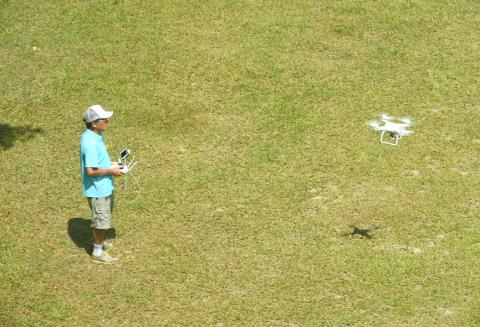The Taichung City Government is planning to ban drones in two public areas — the Calligraphy Greenway and Citizen Plaza — later this month in a bid to prevent injury from drone collisions or malfunctioning machines.
The city’s Construction Bureau said that as the devices are growing in popularity and more people are using them in public spaces during holidays, there is a risk to people and property from drones colliding and crashing to the ground.
Residents in buildings around the plaza and greenway have expressed concern about the camera-equipped devices encroaching on their privacy, the bureau said.

Photo: Chang Chia-ming, Taipei
There is also the risk of signal interference as drone usage grows, causing loss of control over the devices and potential accidents, the bureau added.
It cited as examples a drone crashing into the Taipei 101 skyscraper in July last year; a drone falling and injuring a woman at Sun Moon Lake in June; and another one crashing into the High Speed Rail tracks in Hsinchu.
“Using drones can be dangerous and there is still no government agency tasked with regulating their usage. This is especially problematic given that the machines can be purchased online for as little as NT$50,000 to NT$60,000. The low cost of drones means that they can now be seen flying everywhere, spreading with no resistance,” said a bureau official, who declined to be named.
The bureau said that public safety and environmental protection are its main concerns, and it aims to prevent an incident before one occurs.
It added that in accordance with public interests, it will invoke Item 11.2 of Clause 99 of the Civil Aviation Act (民航法) to prohibit the operation of drones in prohibited and restricted areas.
Calligraphy Greenway and Citizen Plaza will be designated as two of these restricted areas under the city’s park ordinance, the bureau said, adding that signs will be posted and an announcement made before the new restrictions take effect later this month.
No exact date was given.

‘DENIAL DEFENSE’: The US would increase its military presence with uncrewed ships, and submarines, while boosting defense in the Indo-Pacific, a Pete Hegseth memo said The US is reorienting its military strategy to focus primarily on deterring a potential Chinese invasion of Taiwan, a memo signed by US Secretary of Defense Pete Hegseth showed. The memo also called on Taiwan to increase its defense spending. The document, known as the “Interim National Defense Strategic Guidance,” was distributed this month and detailed the national defense plans of US President Donald Trump’s administration, an article in the Washington Post said on Saturday. It outlines how the US can prepare for a potential war with China and defend itself from threats in the “near abroad,” including Greenland and the Panama

A magnitude 4.9 earthquake struck off Tainan at 11:47am today, the Central Weather Administration (CWA) said. The hypocenter was 32.3km northeast of Tainan City Hall at a depth of 7.3km, CWA data showed. The intensity of the quake, which gauges the actual effect of a seismic event, measured 4 in Tainan and Chiayi County on Taiwan's seven-tier intensity scale, the data showed. The quake had an intensity of 3 in Chiayi City and County, and Yunlin County, while it was measured as 2 in Kaohsiung, Nantou County, Changhua County, Taitung County and offshore Penghu County, the data showed. There were no immediate reports of

The Chinese Nationalist Party (KMT) is maintaining close ties with Beijing, the Democratic Progressive Party (DPP) said yesterday, hours after a new round of Chinese military drills in the Taiwan Strait began. Political parties in a democracy have a responsibility to be loyal to the nation and defend its sovereignty, DPP spokesman Justin Wu (吳崢) told a news conference in Taipei. His comments came hours after Beijing announced via Chinese state media that the Chinese People’s Liberation Army’s Eastern Theater Command was holding large-scale drills simulating a multi-pronged attack on Taiwan. Contrary to the KMT’s claims that it is staunchly anti-communist, KMT Deputy

RESPONSE: The government would investigate incidents of Taiwanese entertainers in China promoting CCP propaganda online in contravention of the law, the source said Taiwanese entertainers living in China who are found to have contravened cross-strait regulations or collaborated with the Chinese Communist Party (CCP) could be subject to fines, a source said on Sunday. Several Taiwanese entertainers have posted on the social media platform Sina Weibo saying that Taiwan “must be returned” to China, and sharing news articles from Chinese state media. In response, the Mainland Affairs Council (MAC) has asked the Ministry of Culture to investigate whether the entertainers had contravened any laws, and asked for them to be questioned upon their return to Taiwan, an official familiar with the matter said. To curb repeated